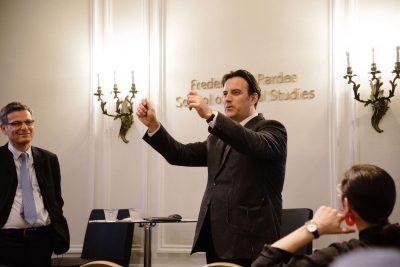
Nestled inside a room in the Boston University Frederick S. Pardee School of Global Studies, Dimitar Bechev held his audience in rapt attention as he discussed religion and foreign policy in the Balkans in a lecture Feb. 7.
The lecture delved into the religious identities and international relationships of Russia, Turkey and their neighboring countries.
Bechev is the director of the European Policy Institute, a think tank located in Sofia, Bulgaria, and was accompanied in the lecture by Vesko Garcevic, a professor of practice of international relations at Pardee.
Garcevic said in an interview he believes this talk helped dissect Russia’s extensive reach into the affairs of Eastern European countries, a topic he said he previously discussed with the European Parliament and U.S. Congress.
Hosting Bechev and helping moderate the discussion was a special kind of victory for Garcevic, he said. Bechev is a source of deep admiration for Garcevic, who uses Bechev’s book when discussing the Balkans relations with Russia and the European Union, he said.
“Though I know him well and I’m quite familiar with the subject, this type of event can help you deepen your knowledge of the topic as his viewpoints were not always identical with mine,” Garcevic said.
Bechev’s lecture attracted BU students alongside other scholars on Eastern Europe.
Metropolitan College student Artemis Friel attended the lecture and said that she became interested in Russian foreign policy as rumors of Russian collusion during the 2016 U.S. presidential election began to spread rapidly.
As Friel’s knowledge of Russian foreign policy increased, so too did her curiosity about other Eastern European countries, she said, and this interest inspired her to attend the lecture.
“I try to understand as much as I can about the relationship Russia has with other countries, but particularly with its former Soviet Union constituents,” Friel said. “Russian involvement in that area in the world is potentially a pretty good indicator of their future policies and intentions.”
While some students attended the lecture aware of their interest in the topics discussed, others left with newfound knowledge.
Ava Shome, a sophomore in the College of Communication, said she attended Bechev’s lecture to fulfill an assignment for one of her classes yet found her interest peaked as the talk progressed and Bechev scrutinized how Russia attempts to frame itself as a pious nation.
“I did not really know much about this subject matter going into this lecture, so it was just interesting to learn more about it from someone who was so experienced in this area,” Shome said.
While Brechev primarily focused on Russia, Shome expressed interest in the relationship between Russia and the United States.
“If I were to attend another lecture by Dr. Bechev, I would ask him how the religious identity and foreign policy of Russia and Turkey affect the United States or how it could in the future,” Shome said, “and if there is anything that the U.S. can do to stay involved.”
Gowtham Asokan, co-editor-in-chief of the BU International Relations Review and senior in the College of Arts and Sciences, said Russia’s global dynamics are changing.
“If the current trend keeps up, the U.S. will be reduced potentially,” Asokan said. “Watch the Balkans slip away toward the Russian orbit and see the EU become more self-reliant, this diminishing and ending the American century of global dominance.”
Asokan said through these changing dynamics, Russia could pose a significant threat to the West.
“Russia’s policies are definitely an existential threat to the ‘western liberal world order’ built by America and Europe following World War II,” Asokan said. “It does not help that America has radically departed from their conventional approach to isolationism again.”
Friel added that she believed Bechev’s wide-spanning appeal, in particular, lies in his ability to connect several underlying issues in a manner that makes foreign policy understandable regardless of prior knowledge.
“He understands that you need to approach foreign policy from several different angles,” Friel said, “such as history, religion and state-to-state relations.”
























































































































